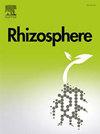莫霍温芽孢杆菌 B1302 的环脂肽对小麦根腐病的抗菌作用
IF 3.4
3区 生物学
Q1 PLANT SCIENCES
引用次数: 0
摘要
Bipolaris sorokiniana 是危害小麦的主要病原体,可对小麦种植区造成重大灾害。本研究从莫氏芽孢杆菌 B1302 中提取了环脂肽(CLP),并对 Bipolaris sorokiniana 和其他四种病原真菌具有抗菌活性。CLP 能抑制 B. sorokiniana 的生长,并使菌丝肿胀变形。此外,胰蓝染色和 DAPI 染色显示,CLP 处理组的菌丝发生了扭曲和 DNA 损伤。此外,CLP 对小麦根腐病的防治效果为 80.32%,与商用杀菌剂(多菌灵)相比没有显著差异。其次,在涂油试验中,40 μL CLP(10 mg/mL)的扩散直径达到 8.37 厘米,扩散环稳定,表明 CLP 具有表面活性。同时,CLP 还具有很强的抗氧化能力和 DPPH 清除活性。此外,CLP 对温度(20-40 °C)和 pH(4-8)的耐受性较好,在紫外线照射下处理 3 小时后仍能保持较高的抑制率,在胰蛋白酶处理下也很稳定。然而,CLP 对胃蛋白酶和金属离子敏感。总之,CLP 具有抗菌活性、抗氧化能力和环境耐受性,具有开发成小麦根腐病生物控制剂的良好潜力。本文章由计算机程序翻译,如有差异,请以英文原文为准。
Antimicrobial cyclic lipopeptides from Bacillus mojovensis B1302 against wheat root rot
Bipolaris sorokiniana is the main pathogen affecting wheat, which can cause major disasters in wheat planting areas. In this study, cyclic lipopeptides (CLP) were extracted from Bacillus mojovensis B1302 and had antimicrobial activity on Bipolaris sorokiniana and other four pathogenic fungi. CLP could inhibit the growth of B. sorokiniana and made mycelia swelling and deformed. In addition, trypan blue staining indicated the distortion of mycelia and DAPI staining showed mycelial DNA damage in the CLP treatment group. Moreover, CLP were effective in controlling wheat root rot with the efficacy of 80.32%, which was not significantly different from that of commercial fungicide (carbendazim). Next, in the oil spreading test, the diffusion diameter of 40 μL CLP (10 mg/mL) reached 8.37 cm with a stable spreading ring, indicating CLP had surface activity. And also, CLP had strong antioxidant capacity and DPPH scavenging activity. Furthermore, CLP had better temperature tolerance at 20–40 °C and pH tolerance at 4–8, respectively, still maintained a high inhibition rate after 3h treatment under UV irradiation, and were stable under trypsin treatment. However, CLP were sensitive to pepsin and metal ions. In conclusion, CLP had antimicrobial activity, antioxidant capacity and environmental tolerance, which had good potential for development into biocontrol agents against wheat root rot.
求助全文
通过发布文献求助,成功后即可免费获取论文全文。
去求助
来源期刊

Rhizosphere
Agricultural and Biological Sciences-Agronomy and Crop Science
CiteScore
5.70
自引率
8.10%
发文量
155
审稿时长
29 days
期刊介绍:
Rhizosphere aims to advance the frontier of our understanding of plant-soil interactions. Rhizosphere is a multidisciplinary journal that publishes research on the interactions between plant roots, soil organisms, nutrients, and water. Except carbon fixation by photosynthesis, plants obtain all other elements primarily from soil through roots.
We are beginning to understand how communications at the rhizosphere, with soil organisms and other plant species, affect root exudates and nutrient uptake. This rapidly evolving subject utilizes molecular biology and genomic tools, food web or community structure manipulations, high performance liquid chromatography, isotopic analysis, diverse spectroscopic analytics, tomography and other microscopy, complex statistical and modeling tools.
 求助内容:
求助内容: 应助结果提醒方式:
应助结果提醒方式:


